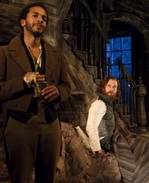SITE GUIDE
SEARCH
REVIEWS
REVIEW ARCHIVES
ADVERTISING AT CURTAINUP
FEATURES
NEWS
Etcetera and
Short Term Listings
LISTINGS
Broadway
Off-Broadway
NYC Restaurants
BOOKS and CDs
OTHER PLACES
Berkshires
London
California
New Jersey
DC
Connecticut
Philadelphia
Elsewhere
QUOTES
TKTS
PLAYWRIGHTS' ALBUMS
LETTERS TO EDITOR
FILM
LINKS
MISCELLANEOUS
Free Updates
Masthead
A CurtainUp Review
The Whipping Man
By Elyse Sommer
|
I can't square anything I don't understand. It ain't ours to square. That's why we always asking . . . sometimes you didn't get answers that you liked. But you kept on asking. That's what a Jew is. We talk with God, we wrestle with him. Sometimes we even argue with Him. We never stop asking, looking, hoping for answers. You don't lose your faith by not getting answers. You lose your faith by not asking questions. . .—Simon What's the news? Have you heard anything?— Caleb War's over. You lost. We won. .— John |

Andre Holland as John and Jay Wilkison as Caleb.
(Photo: Joan Marcus) |
The talented youg playwright Matthew Lopez's The Whipping Man arrives in New York, after several previous regional productions. Dough Hughes has staged the three-character exploration of yet another troublesome chapter in the Civil War's history with symphonic grandeur. The current actors are most impressive as are John Lee Beatty's as always masterly scenery and Jill BC DuBoff's evocative soundscape. Mr. Lopez's script proved its power even with more modest staging when I first saw The Whipping Man as part of last summer's Barrington Stage developmental productions in its intimate second stage in Pittsfield.
While Mr. Lopez may have done some fine-tuning since Christopher Innvar directed it, the story now at MTC's twice as large Off-Broadway venue is essentially the same. My review therefore repeats pretty much everything I had to say last year, but incorporates the current performances and staging.
The Civil War is one of our country's biggest and most far-reaching historic events, but Lopez views it through the narrow lens of a Southern Jewish family who every year commemorated their own escape from slavery in Egypt and yet themselves became slaveholders. This is serious, tense and, at times, hard to watch stuff. Like any good drama it's filled with moments of humor. Dough Hughes has staged the one heavy on blood and gore scene for maximum fist-clenching drama, but his production overall is a moving, well-paced group portait.
The events that jump start the plot are based on historic fact: The exodus of property owners to safer areas after the Confederacy's surrender at Appotomax left Richmond a burnt out wasteland of deserted, looted homes— are based on historic fact. Southern Jews, happy to have found acceptance and prosperity in places like Richmond, were indeed extremely patriotic and joined the Confederate Army in large numbers. Some of them did indeed own slaves, though mostly as household servants since Jews tended to live in urban homes and not on plantations. According to an interview with Lopez (Pam Kruger North County Tmes, May 5, 2010 prior to the play's opening at San Diego's Old Globe). whether these Jewish slave owners trained their slaves to practice their religion, as the predominantly Christian slaveholders did, is more based on hearsay than fact But those rumors about Jewish slaves and the fact that the surrender at Appotomax from April 7-9, 1965 came just days before the first day of Passover was all that was needed to ignite a fire in Civil War history buff Lopez's vivid imagination.
Without going into too much surprise spoiling detail, the play covers just three tension filled days following the end of the War that include the news that President Lincoln has been shot a somewhat belated and decidedly atypical Seder. The problem and emotion fraught events begin with the return of badly wounded Confederate Army Captain Caleb DeLeon (Jay Wilkinson) to his Richmond home on a stormy night. It's all evoked with shiver inducing realism by Jill BC DuBoff's soundscape, Ben Stanton's moody lighting, and the sheer gray curtain dramatically drawn across the wide MTC stage to conclude this as well as other scenes.
The house is stripped bare of what was no doubt its former splendor and unoccupied except for one of the newly emancipated DeLeon slaves , Simon (Andre Braugher) a devoted and devout family retainer. No sooner has the wounded Caleb crashed through the front door and we realize the seriousness of his wound than John (Andre Holland), a younger former slave who grew up as Caleb's playmate, arrives.
Unlike Simon, who symbolizes all men of peace who are less interested in avenging past wrongs than doing the right thing, John is less law abiding and, above all, more gleeful than grateful about his new freedom. He's less likely than Simon to overlook the hypocrisy of observant Jews like Caleb and his family owning slaves. To add to both young men's issues about their Jewish identities, it turns out that each is hiding a secret that must be unraveled before the end of the twisty two hours.
Director Hughes has drawn rich, character defining performances from these men trying to find their way in a world as shattered as Caleb's leg. Braugher is quietly majestic as the older black man who is willing to serve his former master as a free man. The eloquence of this illiterate man does stretch credibility but it's is dynamic enough for it to work, and he has you hoping that his faith will sustain him once a devastating secret known only to Caleb and John comes to light.
Holland's John is a seething cauldron of barely contained rage. He manages to be cocky, yet painfuly vulnerable. As the young master of the ruined mansion, Jay Wilkinson eludes stereotype and instead taps into Caleb's emotional as well as physical . His being able to sit up and talk quite sanely after all the liquor he ingests to endure Simon's surgical procedure on his leg again calls for a suspension of disbelief. In fact, anyone losing all that blood would almost surely die if this wasn't a play.
Beattie, best-known for elegant sets proves himself once again as a designer as adept at darker, more bare bones settings. He subtly allows the grim totally bare set to become just a little bit more lived in as a result of John's various trips to "liberate" chairs and dishes and clothes from other deserted houses. Even when no longer quite so bare, the aura of grimness prevails.
The Whipping Man of the title became the evil ghost overarching the play as a result of the playwright's research into the lives of slaves. As he explained in the above mentioned interview "In an urban environment {as opposed to a large plantation with no neighbors within earshot} you wouldn't want your neighbors to overhear your slaves screaming when they're being whipped. So in many Southern towns, there would be a man you would outsource your whippings to and he would earn a very nice living."
By the time we understand each man's relationship to the Whipping Man, and with each other we know that the questions that are part of their strange but incredibly moving Seder can only be answered by more questions — about how we do what we do, deal with the hand dealt to us, and rationalize injustice. It all adds up to a theatrical experience that's as potently entertaining as it is profound,
The play has attracted strong advance sales and has been extended a second time before its official opening. Could it be following in the footsteps of the much extended Pulitzer Prize winning Ruined?
|
The Whipping Man By Matthew Lopez Directed by Dough Hughes Cast: Andre Braugher (Simon), Andre Holland (John) and Jay Wilkison. (Caleb) Sets: John Lee Beatty Costumes: Catherine Zuber Lighting Ben Stanton Sound: Jill BC DuBoff Fight direction: J. David Brimmer Hair & Wig design: Tom Watson Stage Manager: Winnie Y. Lox Running Time: 2 hours, including intermission Manhattan Theatre Club City Center - Stage I(131 West 55th Street From 1/13/11; opening 2/01/11; closing3/27/11 Reviewed by Elyse Sommer at 1/27 press preview |
REVIEW FEEDBACK
Paste the highlighted text into the subject line (CTRL+ V): Feel free to add detailed comments in the body of the email. . .also the names and emails of any friends to whom you'd like us to forward a copy of this review. Visit Curtainup's Blog Annex For a feed to reviews and features as they are posted add http://curtainupnewlinks.blogspot.com to your reader Curtainup at Facebook . . . Curtainup at Twitter Subscribe to our FREE email updates: E-mail: esommer@curtainup.comesommer@curtainup.com put SUBSCRIBE CURTAINUP EMAIL UPDATE in the subject line and your full name and email address in the body of the message. If you can spare a minute, tell us how you came to CurtainUp and from what part of the country. |

Slings & Arrows-the complete set
You don't have to be a Shakespeare aficionado to love all 21 episodes of this hilarious and moving Canadian TV series about a fictional Shakespeare Company






